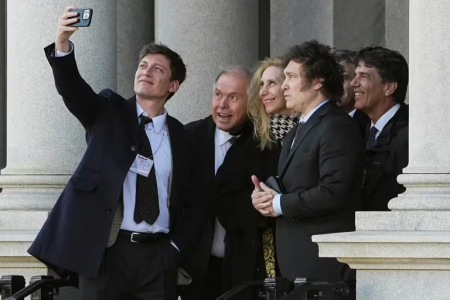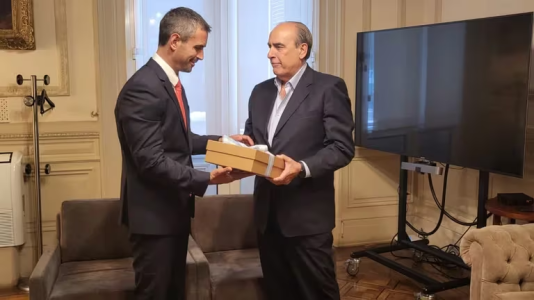Josh27
New member
The Government, one step away from the omnibus law: 24 hours of intense negotiations and one unknown ahead - Infobae

Source:

 www.infobae.com
www.infobae.com
January 19, 2024
The ruling party and the allied blocs made progress in key areas such as retirements, withholdings and privatizations ahead of the possible session next week. The influence of Santiago Caputo and the construction of the official story
By Federico Mayol

President Javier Milei is returning from the Davos Forum while the Omnibus Law is being negotiated in Deputies
If it wasn't a negotiation, a term prohibited in the official script, the dynamics of this week and, especially, of these last 24 hours, seemed quite similar. The decision-making process of the libertarian government is a recurring topic of conversation that disorients the red circle. Not so the construction of an effective and inflexible story carried out daily by Javier Milei, who denies the political system, despite the fact that last night the parliamentary negotiations in around the Omnibus Law project, while the president flew back to the country, they intensified in the office of Martín Menem, the head of the Lower House.
Santiago Caputo, the increasingly influential presidential friend, the brain of that official story to which Milei dedicates a good part of the day, settled in Menem's office yesterday and He monopolized, to the astonishment of several of the legislators from the allied blocs who paraded through that office, and above Menem and the minister Guillermo Francos, the center of the negotiations, even though it exhibited a certain technical lack of knowledge in some of the most sensitive chapters of the so-called Omnibus Law.
“It was the president's voice. He did most of the talking. Menem and Francos only limited”, reflected at the last minute a bloc leader who left Congress after 11 p.m.
Last night, in the allied blocs - the PRO, the UCR and Hacemos Cambio Federal, the bench that combines the PRO, non-K Peronism and the Civic Coalition - they wondered to what extent the government had agreed on the very extensive project of law under debate in view of the half-sanction that Milei intends to have next week in Deputies, and what script the libertarian administration would build around an initiative that, due to the result of the negotiations, allows inferring a series of modifications that are not consistent with that script.

Santiago Caputo, very close to Milei, was one of the names that participated in the meetings with representatives of the opposition
The government has an evident parliamentary weakness: only 38 legislators. And it needs these blocks - between the four spaces there are 132 legislators - for parliamentary success. On that level, Milei's public irreverence is a strategy that is difficult to understand in the allied benches.
In fact, Caputo whitewashed the idea of ruling on Monday and calling the meeting on Tuesday, in a session that is expected to be marathon and that could last almost 48 hours, that is, until Wednesday the 24th, the day of the strike and the mobilization of the CGT and Peronism. A studied staging that, according to what they confided, was rejected by some members of the block chaired by Miguel Ángel Pichetto, among them Emilio Monzó and Juan Manuel López.
Yesterday, according to the sources consulted, it emerged that the government had agreed to go back on the original initiative in several of the most relevant points, and to send the text again with the corrections this afternoon.
The elimination of the retirement formula is one of those aspects. The Executive proposed in the project to adjust salaries on a discretionary basis for an indefinite period, and yesterday it was agreed, in principle, to update based on the Consumer Price Index but starting in March, that is, with February inflation. The modification did not convince everyone present.
In the withholdings chapter, La Libertad Avanza agreed to cancel any type of tax increase in regional economies, but endorsed increases in meat and other commodities. The 15% increase in industrial exports was pending, which this week met with strong public resistance from the UIA.
With the biofuels and fishing regime, the Casa Rosada had already agreed to go back with the modifications due to pressure from the governors. Also in the elimination of the broad outline of the electoral reform - a chapter to which Santiago Caputo dedicated special interest in one of the meetings - and in the emergency and the delegation of powers from Congress to the Executive, with the promise to resubmit in these hours changes in writing.

YPF is one of the state companies that are at the focus of negotiations for privatizations
In the privatization area, it was agreed to exclude YPF from the extensive list of state companies with potential for sale. In the allied blocs they believe that, in truth, the government never had the real intention of privatizing the state oil company and other companies such as ARSAT or Banco Nación. Yes, the changes in the civil code and the ratification of DNU 70 devised by Federico Sturzenegger -with a very low profile these days, in contrast to the acceleration of the negotiations this last week - proposed in article 1 of the Omnibus Law.
For the Sustainability Guarantee Fund (FGS) of the ANSES there was still no consensus: the Casa Rosada promoted the possibility of implementing a kind of control over the original proposal of transferring the fund to the Treasury, that is, to the minister Luis “Toto” Caputo.
The level and magnitude of the modifications accepted by the ruling party was the cause of internal debate last night in the allied blocs, in the midst of an increasingly complex political coexistence. This Friday, Milei had to finish confirming, or not, the viability of the changes.
The head of state is absorbed in his script, fascinated by the libertarian fury of social networks - crossed this Thursday by the repercussions of his presentation at the World Economic Forum in Davos , in Switzerland - which the president personally feeds with a barrage of comments, endorsements, opinions and offenses to which only in these last hours, before embarking back to Buenos Aires, he had dedicated a good number of hours.
In the country, meanwhile, parliamentary negotiations have intensified in recent days. On Wednesday evening, for example, Francos and Cristian Ritondo, one of the legislative representatives of the PRO, met alone in the bar of a hotel on Posadas Street, in lower Buenos Aires, to try to redirect the negotiations, information published by the newspaper La Nación. Hours later, after his usual morning conference, the presidential spokesperson, Manuel Adorni, insisted in statements to CNN Radio: “There is no negotiation here, what is being done is explaining the points of the law”.
During the week, for example, in Menem's office formal negotiations had been enabled for the first time between the allies of the PRO, the UCR and Hacemos Cambio Federal. A work table that those blocks were crying out for.

Martín Menem and Guillermo Francos, the two names who maintain dialogue with the opposition
On Monday, the Casa Rosada sent technical officials from the Presidency and the Chief of Staff. On Tuesday, to Pablo Quirno and Carlos Guberman, two of the collaborators of the minister Caputo. In one of those meetings in the office of the Presidency of the Lower House, Quirno asked for permission to go to the bathroom. The meeting was relaxed for a few minutes. López, president of the CC bloc, took advantage of the intermission to complain about the government's public intransigence: “ We feel like idiots, we didn't vote for Profits last year, Milei did, and we didn't do politics with that”, said the deputy, who focused the attention of the rest of the legislators. At that moment, Quirno returned from the bathroom and joined the conversation. Daiana Fernández Molero, from the PRO, then spoke with an irony: “Milei said that he would cut his hand before voting on a tax increase, even if it could appear with some cut, something”< /span>. They celebrated her with laughter.
Beyond the occurrence, the government's parliamentary allies were impatiently waiting for Milei's administration to accept some of the concessions requested in order to reach a consensus in the next few hours on a majority opinion, in the face of resistance from the Kirchnerist bench, that could give Milei his first parliamentary success.
“The government needs to score a goal as soon as possible”, he highlighted last night to Infobae a governor of Together for Change, disoriented, like most of his colleagues, by Milei's leadership style and the power scheme that the head of state devised for his government.
The thing is that, despite the support of a good part of society that is still reflected in the polls - "There is still a lot of tension in the 'anti', much more than there was in the Macristas when Alberto Fernández won and in the Kirchneristas when Mauricio Macri won,” said a public opinion analyst who works for the PRO-, summer has an expiration date. And the social climate can change from one moment to the next. Despite the effectiveness of the story.

Source:

El Gobierno, a un paso de la ley ómnibus: 24 horas de intensas negociaciones y una incógnita hacia adelante
El oficialismo y los bloques aliados avanzaron en rubros clave como jubilaciones, retenciones y privatizaciones de cara a la posible sesión de la semana próxima. La influencia de Santiago Caputo y la construcción del relato oficial
January 19, 2024
The ruling party and the allied blocs made progress in key areas such as retirements, withholdings and privatizations ahead of the possible session next week. The influence of Santiago Caputo and the construction of the official story
By Federico Mayol

President Javier Milei is returning from the Davos Forum while the Omnibus Law is being negotiated in Deputies
If it wasn't a negotiation, a term prohibited in the official script, the dynamics of this week and, especially, of these last 24 hours, seemed quite similar. The decision-making process of the libertarian government is a recurring topic of conversation that disorients the red circle. Not so the construction of an effective and inflexible story carried out daily by Javier Milei, who denies the political system, despite the fact that last night the parliamentary negotiations in around the Omnibus Law project, while the president flew back to the country, they intensified in the office of Martín Menem, the head of the Lower House.
Santiago Caputo, the increasingly influential presidential friend, the brain of that official story to which Milei dedicates a good part of the day, settled in Menem's office yesterday and He monopolized, to the astonishment of several of the legislators from the allied blocs who paraded through that office, and above Menem and the minister Guillermo Francos, the center of the negotiations, even though it exhibited a certain technical lack of knowledge in some of the most sensitive chapters of the so-called Omnibus Law.
“It was the president's voice. He did most of the talking. Menem and Francos only limited”, reflected at the last minute a bloc leader who left Congress after 11 p.m.
Last night, in the allied blocs - the PRO, the UCR and Hacemos Cambio Federal, the bench that combines the PRO, non-K Peronism and the Civic Coalition - they wondered to what extent the government had agreed on the very extensive project of law under debate in view of the half-sanction that Milei intends to have next week in Deputies, and what script the libertarian administration would build around an initiative that, due to the result of the negotiations, allows inferring a series of modifications that are not consistent with that script.

Santiago Caputo, very close to Milei, was one of the names that participated in the meetings with representatives of the opposition
The government has an evident parliamentary weakness: only 38 legislators. And it needs these blocks - between the four spaces there are 132 legislators - for parliamentary success. On that level, Milei's public irreverence is a strategy that is difficult to understand in the allied benches.
In fact, Caputo whitewashed the idea of ruling on Monday and calling the meeting on Tuesday, in a session that is expected to be marathon and that could last almost 48 hours, that is, until Wednesday the 24th, the day of the strike and the mobilization of the CGT and Peronism. A studied staging that, according to what they confided, was rejected by some members of the block chaired by Miguel Ángel Pichetto, among them Emilio Monzó and Juan Manuel López.
Yesterday, according to the sources consulted, it emerged that the government had agreed to go back on the original initiative in several of the most relevant points, and to send the text again with the corrections this afternoon.
The elimination of the retirement formula is one of those aspects. The Executive proposed in the project to adjust salaries on a discretionary basis for an indefinite period, and yesterday it was agreed, in principle, to update based on the Consumer Price Index but starting in March, that is, with February inflation. The modification did not convince everyone present.
In the withholdings chapter, La Libertad Avanza agreed to cancel any type of tax increase in regional economies, but endorsed increases in meat and other commodities. The 15% increase in industrial exports was pending, which this week met with strong public resistance from the UIA.
With the biofuels and fishing regime, the Casa Rosada had already agreed to go back with the modifications due to pressure from the governors. Also in the elimination of the broad outline of the electoral reform - a chapter to which Santiago Caputo dedicated special interest in one of the meetings - and in the emergency and the delegation of powers from Congress to the Executive, with the promise to resubmit in these hours changes in writing.

YPF is one of the state companies that are at the focus of negotiations for privatizations
In the privatization area, it was agreed to exclude YPF from the extensive list of state companies with potential for sale. In the allied blocs they believe that, in truth, the government never had the real intention of privatizing the state oil company and other companies such as ARSAT or Banco Nación. Yes, the changes in the civil code and the ratification of DNU 70 devised by Federico Sturzenegger -with a very low profile these days, in contrast to the acceleration of the negotiations this last week - proposed in article 1 of the Omnibus Law.
For the Sustainability Guarantee Fund (FGS) of the ANSES there was still no consensus: the Casa Rosada promoted the possibility of implementing a kind of control over the original proposal of transferring the fund to the Treasury, that is, to the minister Luis “Toto” Caputo.
The level and magnitude of the modifications accepted by the ruling party was the cause of internal debate last night in the allied blocs, in the midst of an increasingly complex political coexistence. This Friday, Milei had to finish confirming, or not, the viability of the changes.
The head of state is absorbed in his script, fascinated by the libertarian fury of social networks - crossed this Thursday by the repercussions of his presentation at the World Economic Forum in Davos , in Switzerland - which the president personally feeds with a barrage of comments, endorsements, opinions and offenses to which only in these last hours, before embarking back to Buenos Aires, he had dedicated a good number of hours.
In the country, meanwhile, parliamentary negotiations have intensified in recent days. On Wednesday evening, for example, Francos and Cristian Ritondo, one of the legislative representatives of the PRO, met alone in the bar of a hotel on Posadas Street, in lower Buenos Aires, to try to redirect the negotiations, information published by the newspaper La Nación. Hours later, after his usual morning conference, the presidential spokesperson, Manuel Adorni, insisted in statements to CNN Radio: “There is no negotiation here, what is being done is explaining the points of the law”.
During the week, for example, in Menem's office formal negotiations had been enabled for the first time between the allies of the PRO, the UCR and Hacemos Cambio Federal. A work table that those blocks were crying out for.

Martín Menem and Guillermo Francos, the two names who maintain dialogue with the opposition
On Monday, the Casa Rosada sent technical officials from the Presidency and the Chief of Staff. On Tuesday, to Pablo Quirno and Carlos Guberman, two of the collaborators of the minister Caputo. In one of those meetings in the office of the Presidency of the Lower House, Quirno asked for permission to go to the bathroom. The meeting was relaxed for a few minutes. López, president of the CC bloc, took advantage of the intermission to complain about the government's public intransigence: “ We feel like idiots, we didn't vote for Profits last year, Milei did, and we didn't do politics with that”, said the deputy, who focused the attention of the rest of the legislators. At that moment, Quirno returned from the bathroom and joined the conversation. Daiana Fernández Molero, from the PRO, then spoke with an irony: “Milei said that he would cut his hand before voting on a tax increase, even if it could appear with some cut, something”< /span>. They celebrated her with laughter.
Beyond the occurrence, the government's parliamentary allies were impatiently waiting for Milei's administration to accept some of the concessions requested in order to reach a consensus in the next few hours on a majority opinion, in the face of resistance from the Kirchnerist bench, that could give Milei his first parliamentary success.
“The government needs to score a goal as soon as possible”, he highlighted last night to Infobae a governor of Together for Change, disoriented, like most of his colleagues, by Milei's leadership style and the power scheme that the head of state devised for his government.
The thing is that, despite the support of a good part of society that is still reflected in the polls - "There is still a lot of tension in the 'anti', much more than there was in the Macristas when Alberto Fernández won and in the Kirchneristas when Mauricio Macri won,” said a public opinion analyst who works for the PRO-, summer has an expiration date. And the social climate can change from one moment to the next. Despite the effectiveness of the story.

